From Bengaluru to Shanghai, on the trail of Alibaba’s Singles' Sale
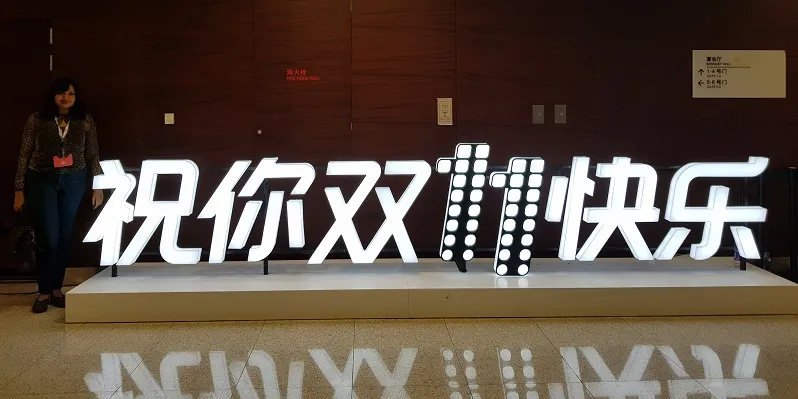
The beginning of the trip wasn’t the best it could have been. We – three journalists and one PR professional representing Alibaba- went from Bangalore to a noxious Delhi and spent four hours waiting for the travel agent to get our passports from the Chinese Embassy.
Once we checked in and boarded, we spent more than an hour inside the aircraft while Malaysian Airlines worked on rectifying some technical error (no complaints there, given the airline’s past history!) But this could not tamper my spirit – for the first time, I was going to Shanghai and attend the Double 11 Global Shopping festival, also known as the Singles' Sale, conducted by Asia’s largest e-tailer Alibaba.
We finally took off for Kuala Lumpur, but were late and missed the connection to Shanghai. Thankfully, the airline put us up in JW Marriott till the next flight to Shanghai. Time for some much-needed rest, followed by a heavy lunch. I needed to be fresh and energetic – for a journalist who covers e-commerce, Alibaba’s flagship event is more exciting than I can explain: the advanced tech and AI associated with it and the billions made in 24 hours have been making history every year since they launched Double 11 in 2009. Now was my chance to see it in live action!
Finally, Shanghai
By the time we reached Shanghai, at around 3am on 11.11, we had missed most of the Gala Celebration on November 10. Nicole Kidman was in attendance, there were performances by Pharell Williams and Katy Perry, and the biggest celebrity of them all – Alibaba Founder and Chairman Jack Ma himself – had made an appearance.
In fact, in retrospect, my only downer on this trip was missing out on the opportunity to see Jack Ma in flesh and blood. The whole Shanghai experience otherwise was worth the effort it took to get to the city - thanks to VPN, I could even access Google, Facebook, Twitter, and WhatsApp which are banned in the country.
The financial capital of China is glamorous as can be. Unlike Beijing, the air is not polluted; unlike HongKong, you don’t need to shell out your monthly salary to pay for lunch; and unlike the rest of China, English is not rare.
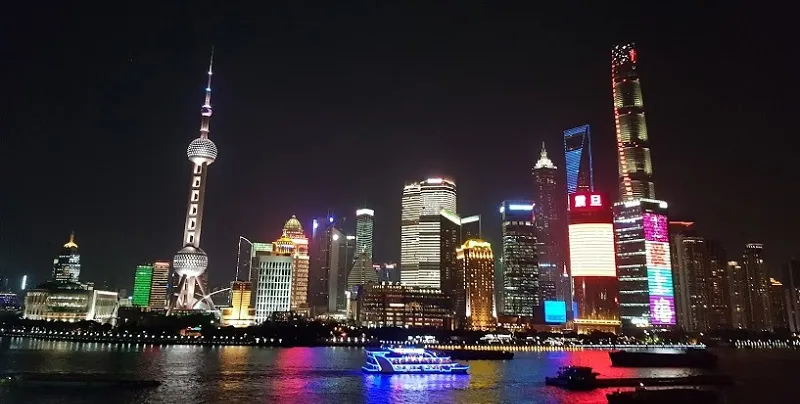
We were put up at the plush Shangri La hotel. The glass windows of my room gave me a view of some of the tallest buildings I have ever seen! I was too excited to sleep, and jet lag didn’t help.
But what awaited us in the morning was even better. Because it is not every day that the Alibaba Group’s CMO, Chris Tung, addresses the international media and reveals all the strategies Alibaba has used for its famed Double 11 Global shopping festival. Chris elaborated on the elements of digital business transformation, brand experience management, and how Alibaba is redefining retail businesses with its data technology through New Retail (which you will get to read in detail soon on YourStory).
Also read: 'India is very important for Alibaba,' says CEO Daniel Zhang
However, Chris’s fluent English presentation ended with a slightly awkward Q&A session in which he was asked about intrusion of customer’s privacy. Alibaba’s tech determines not just customer preferences and purchase history, but also facial features and body measurements, etc.
Chris assured the media that the data is not shared with outside individuals or misused in any way and that digital marketing is “all about understanding as much about the customer as possible”. I couldn’t help but think that there is lesser security for the data associated with Aadhar Card in India.
At the Mercedes Benz Arena in the heart of Shanghai, Alibaba had arranged a media centre. Double 11’s sale numbers were telecast live and some of the top leadership, including Hema Founder Hou Yi, Rural Taobao SVP Trudi DAI, Ciaoniao President Wan Lin, Alibaba Group CTO Jeff Zhang (livestreamed from Hangzhou), and Ant Financial CEO Eric JING among others, were speaking to the audience of about 70 journalists. But things were much more interesting in the hall outside the media hall, where Alibaba’s technology was displayed in its full glory.
Tech rules fashion
Fashion AI was easily the most impressive of Alibaba’s tech – it provides Al-powered fashion mix-and-match suggestions for consumers from stylists on the Taobao and Tmall platforms as well as merchants. Fashion AI picks up what you took off the hanger at the model outlet, and shows recommendations once you choose the size, complexion, hairstyle, and body measurements, etc. There are about five lakh recommendations from their algorithm, and the characteristics of each item (colour, material, style etc.) are saved in the database.
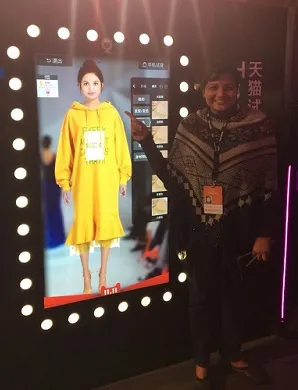
My favourite was the Tmall dressing mirror – it has a camera that captures your face, applies it to the figure on screen, adds your body measurements, complexion, hair style and style preferences in apparel, shoes, sunglasses, etc. It goes on to show you how you look in different outfits. (In fact, the mobile ‘Virtual Fitting Room’ function on Taobao/Tmall app can virtually dress customers in their selected fashion and show them how they would look on the phone screen. Customers only need to upload a photo, and, input their height and weight data.)
Then there is Magic Mirror. As a lipstick addict, I can vouch that this is every lipstick lover’s ideal shopping experience. You stand in front of its camera and click on the lipstick shades on the screen. Your reflection will mirror that lipstick shade on you - no need to keep wiping your lips off with cotton 14 times to try four lip colours!
I was frantically tweeting and texting my editor while simultaneously reporting on the developments, but no complaints there. I have covered Flipkart’s Big Billion Days sale and Myntra’s End-of-Reason sale where I watched the team’s excitement as the digits go from four digits to 10 digits in GMV. But the Alibaba experience made it look like child’s play.
At 11.30 pm, you could sense excitement mounting in the air. The Alibaba team, including CEO Daniel Zhang who had earlier spoken to media, was counting down to midnight. As expected, the number at the end of the sale was a whopping $25 billion. The Alibaba Group surpassed its last year’s Singles' Day sales of $18 billion.
A little bit of trivia here – apparently when Double 11 started nine years ago, it was advertised as ‘Single’s Day’ to attract an audience who are single and independent – who can shop and enjoy their income!
Taking Alibaba’s tech to offline world
The next couple of days were spent visiting Alibaba’s smart stores and Hema grocery store. Now, I am pretty familiar with how online grocery works in India – whether it is private labels or omni-channel routes, players like BigBasket, Amazon, and Flipkart are going all out on strategizing or the biggest category in retail here. But nothing could have prepared me for what I was about to see in Hema grocery stores which function with Alibaba’s next-generation technology.
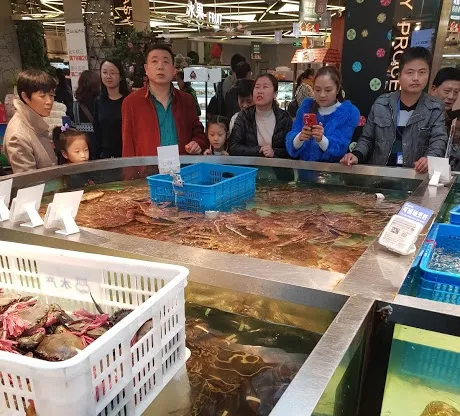
Hema serves fresh fruits, vegetables, and seafood. Once you scan the QR code with your Tmall app, it shows details like the item’s date and place of origin, its price, weight, how to store etc. The store packs your items and sends them to your car park at the shopping premise too. Or you can get them delivered to any location within 3 km from the store. If your location is farther than that, you can pick it up from a delivery point nearer to your location.
You could choose to buy live seafood at the store and get it delivered to your home, or have it cooked at the store and eat there. There is even facial recognition at check out for Alipay users. (Read more about it on YourStory over the next few days.)
We also visited a store for Aline De Rose, a local brand from Hang Zhou, in Joy City shopping mall in Shanghai. Alibaba’s tech shows the store which items were and were not tried using radio frequency identification (RFID) embedded in the items and mirrors in the store so that they can prepare and manage inventory better. This is basically digitisation of offline stores’ footprint. In short, Alibaba’s tech talks to the shop’s own inventory management system.
Head of the Dragon
Shanghai gets that title from its richness - the highest GDP in the country belongs to the city. Posh cars line the vast roads of the city and the famous Shanghai Yangtze River Tunnel and Bridge (9km). The government, in an effort to reduce traffic problems in the city with 30 million residents, has made license plates expensive (except for electric cars) with more than $10,000 for one. Most taxis are Volkswagen, the first international car company to enter China.
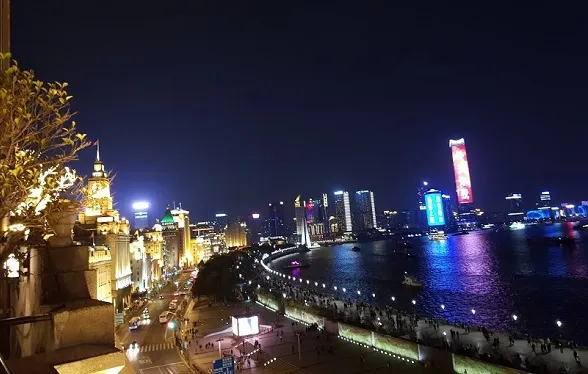
Tony, our tour guide, tells us that Shanghai-ites think Shanghai is the “centre of the universe, and anywhere outside the city is a village.” Of course, Tony is from HangZhou, which remains a “village” despite being the headquarters of Alibaba Group. To be fair, all the people we saw in Shanghai, men and women, were impeccably dressed; the streets were spotless.
New Shanghai is hardly three decades old unlike the 100-year-old Old Shanghai, which reminds you of London with its ancient, regal buildings. Alibaba also treated us to a grand dinner at ‘M on The Bund’ restaurant, from where the view reminded me of Edinburgh on one side and Manhattan on the other. (The Bund is famous for being one of Shanghai’s earliest international settlements.)
What I found impressive about Shanghai was the popularity of bicycle renting. Startups like OFO and Mobike offer bicycles for a whole day’s ride at as little as 1 RMB; a user just needs to scan the QR code on the cycle with their phone app and it unlocks itself. At the end of the journey, you can leave the cycle at any designated spot in the city lanes, and it locks itself again.
A little tour in the old and new Shanghai
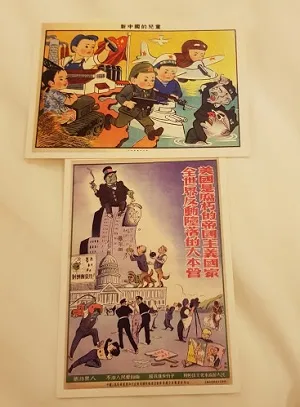
For our sightseeing tour, we - the Indian media team - first chose Shanghai Propaganda Poster Art Centre, a private museum that’s easy to miss as it is situated in the basement of an apartment building. (Tony was impressed that we found out about this place at all! He told us nobody has ever asked him to be taken there!)
Photography was not allowed at this three-room museum which tells the story of China’s economic and cultural evolution since early 20th century. It started with the Republican period in the first half of the century, and involved themes like patriotism, nationalism, social protests etc.
Among the more interesting posters were those celebrating the birth of new China, its republic, land reforms, on phenomena like Birth Control Revolution, and some extremely anti-US ones with slogans like ‘The more we fight, the stronger we are, and the more the enemy fight, the weaker they will be’.
Apparently, towards the end of 1970s, all propaganda materials were deleted from government organisations and sent for paper recycling, which is why these posters are still in demand. I could not help but drool over the history of a nation which is infamously reclusive to the outside world.
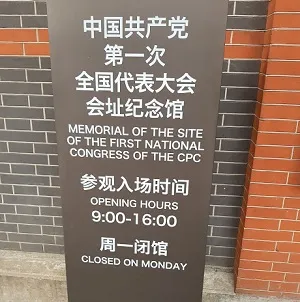
The Keralite in me was excited to see the Communist part of China (CPC) office in Huangpi Nan road.
Old Shanghai is a different world, with street food comprising – for want of a better word, extraordinary – items like scorpions and baby octopuses. There are a million shops with beautiful silk scarfs, pearl jewellery, trinkets, and other gift items.
Needless to say, I left with a substantially thinner wallet and a happier smile.
Next day, when we were on the way to the airport, I could not help but wish a little that maybe our flight was cancelled and we get to stay in Shanghai for one more day. Well, you can’t have everything in life; the flight was on time.







